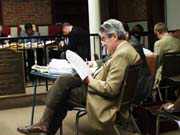James Segreto is back.
A lawyer known for his long, detailed cross-examinations of developers at Planning Board hearings appeared at Thursday night’s meeting regarding a proposal to turn the old Maxwell House property into 982 residential units.
The breakdown of the meeting was as follows: seven minutes of new testimony, 20 minutes of questions from the public, and over two and half hours of cross examination from the well-respected, yet reputedly verbose, Segreto.
Segreto is representing Kings Supermarket and Sparrow Wine and Liquors in opposition to the large residential development, which may have its own retail stores. Other neighbors of the project have been opposing it as well, saying it will be too big.
Architect Dean Marchetto spent approximately three hours Thursday night answering questions about the site from 10th to 12th streets. The plan calls for 982 residential units, including townhouses, duplexes and apartments; 1,674 parking spaces, and a four-acre waterfront park that will be fully accessible to the public. Each unit in the development, if approved, will be slightly over 1,100 square feet in area, and the entire residential component will equal roughly 1,090,000 square feet.
The hearings for the project started in September of last year. The property has been a highly controversial topic in Hoboken because of its size and because Mayor David Roberts has gone on the record saying he wants to purchase the land to build a new technology-oriented middle/high school there (see story inside).
The application currently before the Planning Board requests no variances to the city’s zoning code. Therefore, the Planning Board would theoretically have to approve the application. But neighbors and two retail stores in the area would like to see it stopped.
The zoning code governs size, height, density and allowed uses for new development in town. It’s the burden of the applicant to prove that the project conforms to the city’s codes. For the Planning Board to deny the application, attorneys for the opposition or members of the public must prove to the nine-member volunteer board that one or more aspects of the project doe not obey the developmental rules set out by the city.
Two minutes for every one
By 7:45 p.m., Segreto began his cross-examination of Marchetto. He was allowed two minutes of questioning for every minute of the applicant’s past testimony before the board. In this case, Segreto was given two hours and 40 minutes to conduct his testimony.
And he made use of it.
On Segreto’s table was a pile of over 20 maps, drawings and surveys outlining the project. Segreto went through each map one by one, dissecting even the finest print and asking Marchetto the most technical of questions.
The performance was reminiscent of Segreto’s cross-examinations in the mid-1990s when he represented the Coalition for a Better Waterfront and relatives of the owner of the now-defunct local Foodtown Supermarkets in trying to block the Shipyard Development Project at 14th and Hudson streets. That Planning Board testimony ended up lasting for more than 35 hearings, and the result was ultimately thrown out in court when a judge said that the project had been given too many variances.
The city, wanting the project, changed the zoning in the area and the project was eventually re-approved without as many variances. During those hearings, the Foodtown owners dropped their opposition when the Shipyard developers made a written agreement with them not to include a large Shop-Rite supermarket in the plans.
Thursday, Segreto slowly meandered through issues including: the title conveyance of the property dating back to the turn of the century; an in-depth discussion about what is the legal differentiation between a block and a lot; and other highly intricate planning issues associated with Marchetto’s renderings.
The questions eventually got so detailed that Arnold Mytelka, the attorney for the developers, questioned whether Segreto was conducting a filibuster.
“When his time runs out and he asks for more time, I’m going to strenuously object because he is squandering his time,” said Mytelka. “He’s asking questions that are way out of the scope of Mr. Marchetto’s expertise.”
Mytelka bumped heads with Segreto several times over the style of cross-examination. One of the more tense moments between the two attorneys occurred when Segreto asked Marchetto a question about how the developers drew the lot lines for the project. Marchetto started to look for a different map that showed in more detail where the lines were drawn. But Segreto, who was going document by document, asked Marchetto not to refer to other drawings.
Mytelka objected. “This is not a school and Mr. Segreto is not the principal,” said Mytelka. “Mr. Marchetto may refer to whichever document he wants.”
Segreto changed how he phrased the question and continued to trudge on for two more hours.
Daniel Gans and George Vallone, the owners of the Hoboken Brownstone Company and developers of the property, sat by their attorneys the entire time.
“Were moving along, albeit slowly,” said Gans during an intermission. “We’re just happy that our testimony is being heard.”
The next Maxwell House meeting is scheduled for April 18 at 7 p.m. at City Hall.
